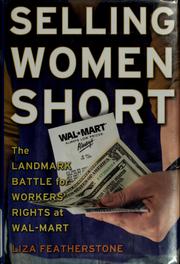
Selling women short
By Liza Featherstone
Subjects: Diskriminierung, Law and legislation, Wal-Mart Stores, Trials, litigation, Droit, Sex discrimination in employment, Arbeitsplatz, Wal-Mart (Firme), Case studies, Procès, instances, Wal-Mart (Firm), Discrimination sexuelle dans l'emploi, Relations industrielles, Cas, Études de, Frau, Sex discrimination against women, Discrimination à l'égard des femmes, Industrial relations
Description: "Betty Dukes is a devoutly religious African-American woman who didn't know the meaning of sex discrimination until she started working for Wal-Mart. She joined the company to get ahead, hoping to become a member of the "Wal-Mart family." But her dedication and effort led nowhere, and this family left her out in the cold. After one too many humiliations, Betty - who still works at Wal-Mart - became the lead plaintiff in the largest civil rights class-action suit in history: Dukes v. Wal-Mart Stores, Inc." "Wal-Mart employees on television appear to be delighted with their jobs, but reality is another story. The average national wage for male cashiers at the company is $8.33; the average for women doing the same job - and often with more experience - is $8.05. The overall difference between male and female managers' salaries is about $14,500. Women are routinely denied promotions, or even the opportunity for further training. Sexist comments and direct insults are a part of daily life in this self-styled Christian company - and single mothers are told to make room for a less qualified man "with a family to provide for."" "But the women of Wal-Mart are fighting back. Despite the enormous obstacles of poverty-level wages and retributive punishments from their employer, they have not stopped working for justice. In June 2004, plaintiffs won certification of a class action suit that will cover 1.6 million current and former employees. Journalist Liza Featherstone has followed the women and their lawyers every step of their journey, and in her explosive investigation of this historic lawsuit she brings to light not just the discriminatory practices of the world's largest employer, but the voices and opinions of the workers it has tried to silence."--BOOK JACKET.
Comments
You must log in to leave comments.